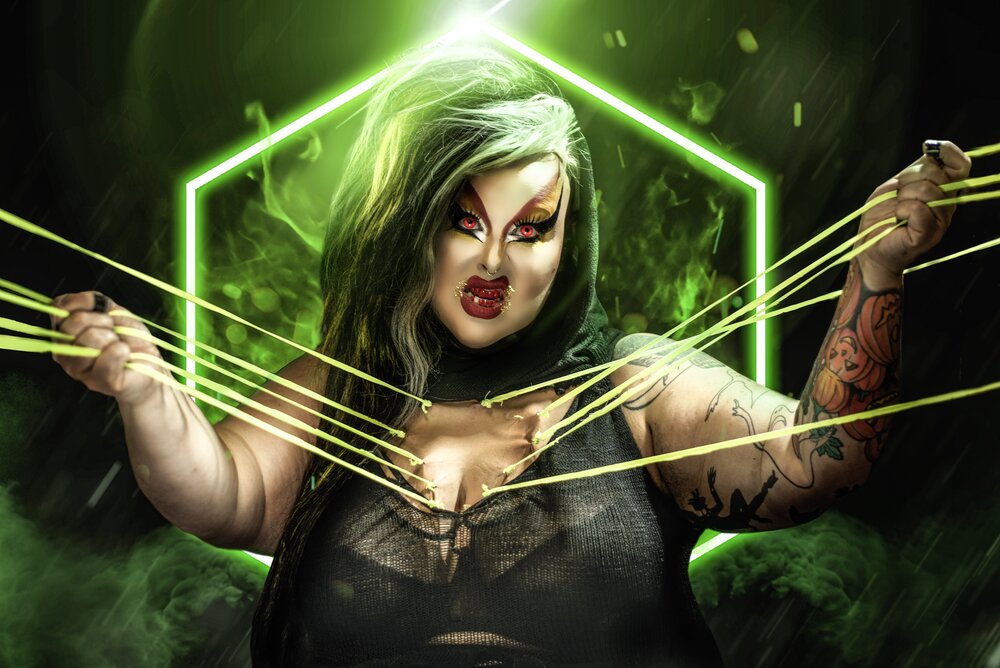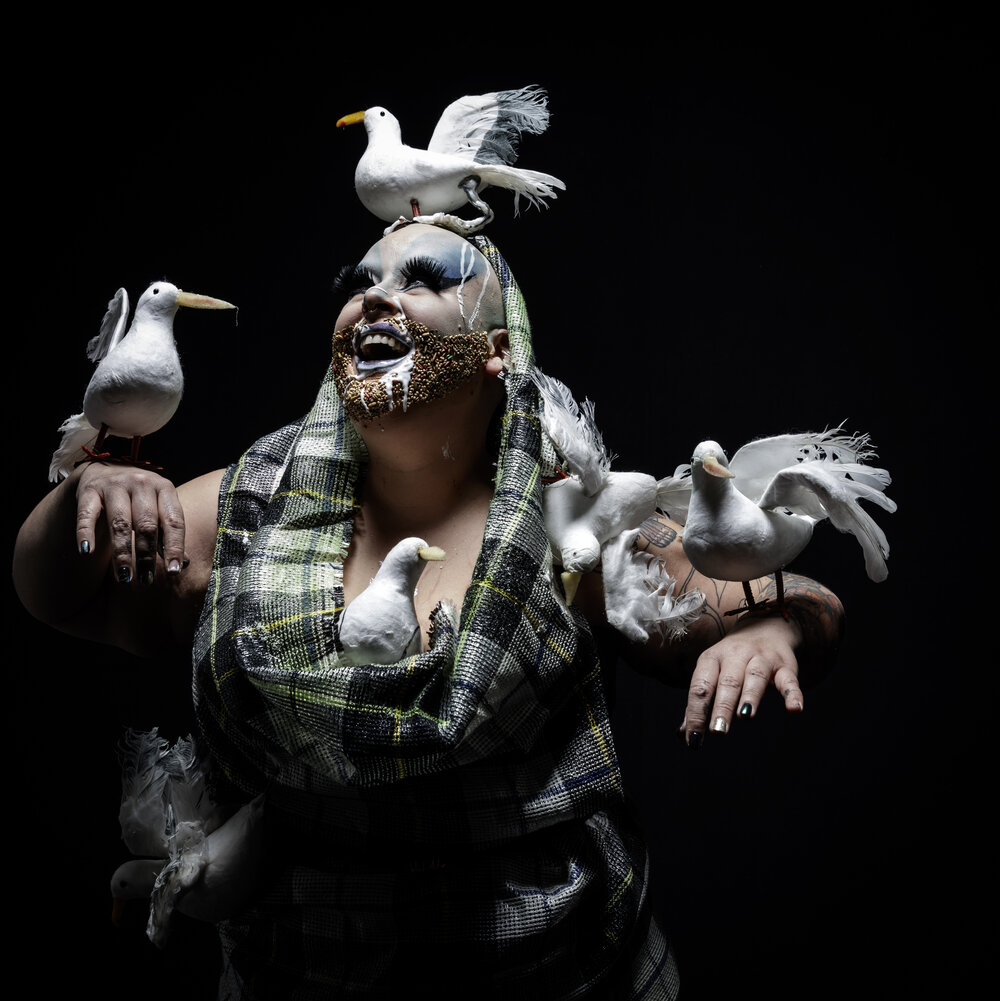
PHOTO: Alejandro Carvajal
In Petaluma California, at the age of 14, a queer performer was born. Starting as a teen performer in Petaluma’s cast of the Rocky Horror Picture Show, Hollow Eve became introduced to the world of John Waters, BDSM and drag while attending college in San Francisco.
Eve’s first time in drag was a parody political performance as Rush Limbaugh around 2003, as they recall it.
Fast-forward to over a decade later, where one night at a club in L.A., Eve found themselves in conversation with season one winner and friend Vander Von Odd. Odd brought up Dragula and the need for Eve’s voice to be heard, but Eve remembers being hesitant, joking about how season 6 might be their time. It turned out that Vander’s influence did encourage Eve to try out, and the rest is history.
On Dragula
“I am grateful to have been given the platform I was,” Eve said of their experience on the show. “I get a lot of hate but also a lot of love. I’m post-binary but polarizing.”
Eve explained that they wanted to go on Dragula, not just to compete and display their art, but largely to have hard conversations about privilege and gender and to discuss the representation of AFAB, non-binary, trans, and women drag performers.

One of these moments came in the form of a passionate monologue where Eve discussed competitor Priscilla Chambers’s use of the term “fishy,” which is used regularly by drag queens to refer to queens who look “feminine” or “passable.” Eve’s point was that the word reduces what it is to be feminine to an offensive trope of a vagina, thus stigmatizing vaginas as “gross” and perpetuating the binary idea that vaginas are required to be feminine or a woman.
“I didn't say, ‘Priscilla, you're canceled,’” Eve said. “I just explained that using the term hurts people. Now it's [her] choice, knowing it hurts people, to continue [using it] or to stop using it. I'm not here to cancel people. Cancel culture is not good because we have to continue having conversations.”
When it comes to tone, Eve jokingly explained: “I’m Italian, passionate and intense.”
“I don't make art to appeal to everyone. I make it to unpack my life.”
Eve’s final episode was complete with another fiery monologue, this one explaining their costume and the beauty of celebrating menstruation in a world that so often demonizes it and the people who experience it. Since the show, Eve has made several apologies on social media for only speaking about women in their dialogue.
“Being on a reality competition is very straining and …. by the time I got to the finish of it, I felt there was a part of me that was lost a little,” Eve said. “I ended up using language to refer to the menstruation cycle as only for women. That excluded even my own identity, which I feel was just lost in the stress of the competition and the extreme circumstances that it takes to film reality television.”
On Identity
Eve identifies as post-binary, meaning they don’t identify exclusively with any gender, and that they believe one day there will be a world without gender, a world where people aren’t men or women - people are just people.
“Gender cant destroy itself until everyone is equal because then over-defining gender becomes meaningless,” Eve said.
Not surprisingly, Eve’s identity and ideas about gender directly influence their drag.
“What my drag concept was - when I named myself Hollow - it’s a space to be filled, a space to unpack all genders, a space to be able to embody any identity that I want,” Eve said. “I call it a space to be filled. It also turns into a cheeky pickup line: ‘Hi I’m Hollow, a space to be filled.’ I don’t want to be limited by one or another - I wanna be whatever I wanna be. People who walk through the world see me as a woman - that’s how I get treated, but I just wanna be seen as a person … or maybe a creature.”
Throughout Eve’s career, they have been redefining what it means to do drag. Eve explained that their goal is not to shock but to incite hard questions and meaningful conversations about identity in the queer community.

PHOTO: Eric Magnussen
“Shock for the sake of shock isn't interesting unless you’re into electrocution,” Eve said jokingly. “To limit drag and say it’s only one thing, is to erase most performers. I don't make art to appeal to everyone. I make it to unpack my life. A lot of people think what I do promotes self-harm, [but] that hasn't been my experience, to release through pain. It can trigger people, which has been a conversation.”
For one performance, Eve covered themself in bugs and killed hundreds of cockroaches before placing them in mini coffins. A funeral was held for the roaches, and Eve explained that the performance asked ‘what is the volume of life’ by killing.
Eve described their most intense performance, an installation done with fellow performer God’s Little Princess. The 45-minute project won the pageant they were performing for.
“We decided to unpack the shame of gender bathrooms, the shame of breastfeeding in public, and the shame of queer sex being pushed into bathrooms by building an outhouse,” Eve said. “We had to do it outside because it would be illegal to do it in the bar. And it was illegal to do it on the street as well, but we did it.
It started with me sitting on the toilet, naked, masturbating. Once I came, God’s Little Princess was born out of the toilet underneath me.
She started to explore her dysmorphia by gently touching my breasts until she started breastfeeding from me and that made me really uncomfortable because I have body dysmorphia with my breasts.
She starts getting more and more upset, wanting breasts of her own. She starts scratching and tearing at my breast that she’s feeding from while I start cutting my other breast because I don’t want children, I don’t want this breast, I don’t want this ability to make children, I don’t want this responsibility.
Then she gives up and slaps my breasts and gets up and stands above me and pisses down my breasts that I had been cutting. So there was blood and piss dripping down my body. She stands above me and masturbates while I push my boobs behind my body then let them hang [over and over]. And when she’s done masturbating, or gives up because it’s futile, she starts tucking her penis and then letting it hang [over and over].
And so we’re both sitting there just trying to change the body that we have, then we face and watch each other do that. Then we can see each other’s dysmorphia and we can see the way that we were the same. So I helped her down from standing on top of the toilet then we proceeded to destroy the interior of the outhouse until nothing was left but a box frame and a toilet. We were just literally kicking shingles out and screaming in rage, breaking free from the little structure.
At the end of it, she was shaking with fear, and I just held her while I sat on the toilet and rocked her and told her everything was gonna be okay - in front of everyone with no shame, no walls to define who and what we were.”
The Changing Scene

PHOTO: RJ Muna
Since the show, Eve has had the ability to travel to new and exciting places to perform and meet other queer performers, making sure to go to Boston monthly.
“I was just in Denver performing KOVEN, an entirely trans show, being run by trans and non-binary POC,” Eve said. “San Francisco has a pretty diverse scene, it’s not amplified as much as other scenes, [but there is] a long history of women on stage.”
Eve also regularly asks that trans people be able to attend their shows for free, a concept in practice at different queer bars. Eve believes this is an important step to making trans people feel comfortable in spaces where they may otherwise feel pushed to the margins.
Eve believes the drag scene is changing as visibility is given to AFAB, women, trans and non-binary performers. Eve now lives in L.A., and said that diverse stages can be regularly found in L.A. and San Francisco. The real test to if a club is diverse is not just when they have AFAB, women, trans and non-binary performers, but when AFAB, women, trans and non-binary people are running and producing the show.
Despite the gradual reckoning of the ‘other’ types of drag, there is still much work to be done in the areas of inclusivity and justice.
“We need spaces for people to fail without being shamed, spaces where they can learn and grow,” Eve said. “The solution to building community and family is storytelling. It’s how we created language. It’s who we are.”
—
Luke Gardner is a radical journalist and student who lives in metro Atlanta. To see his work or for contact information click here.